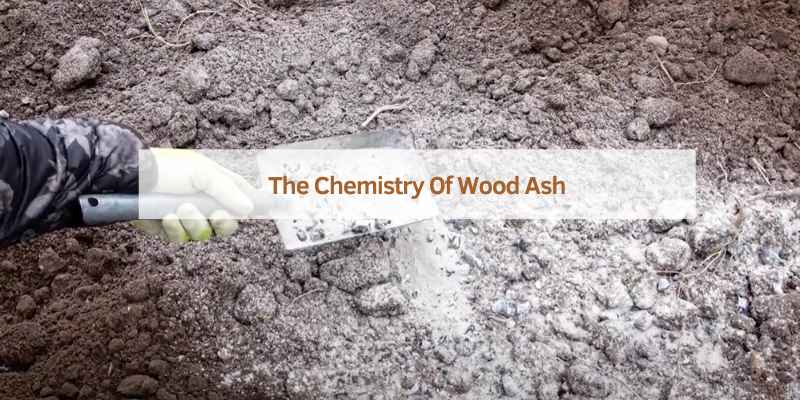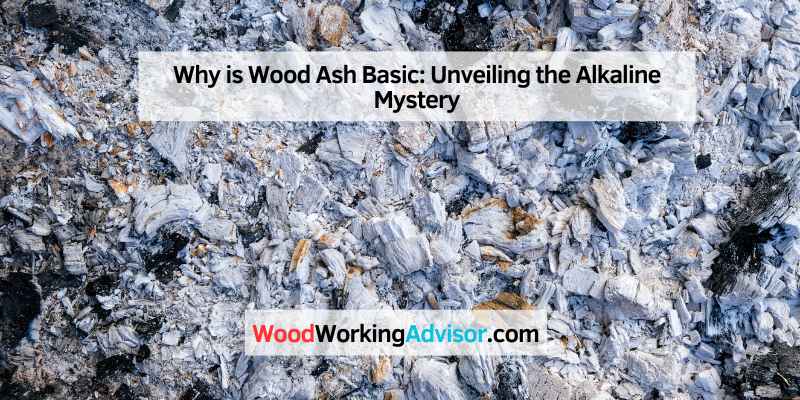Wood ash is basic because it contains high levels of calcium carbonate and other alkaline minerals. These compounds increase the pH levels of the ash.
Wood ash has been used for centuries as a natural soil amendment. It is rich in essential nutrients like potassium, calcium, and magnesium. Gardeners and farmers often use wood ash to improve soil health and increase crop yields. Its alkaline nature helps to neutralize acidic soils, making it ideal for certain types of plants.
Always apply wood ash carefully, as excessive use can harm soil balance. Understanding the properties of wood ash can aid in sustainable gardening and farming practices. This natural resource can be a valuable addition to your gardening toolkit.
The Chemistry Of Wood Ash
Wood ash contains many chemicals. It has calcium carbonate, potassium carbonate, and other minerals. These minerals give wood ash its basic nature. The major component is calcium carbonate. It makes up 25-45% of the ash. Potassium carbonate is also present in large amounts. Wood ash also has magnesium, phosphorus, and trace elements. These elements come from the burned wood. Different types of wood produce different ashes. Hardwoods and softwoods have different compositions.
Potassium carbonate is a key component of wood ash. It makes the ash basic. Potassium carbonate forms when wood burns. It reacts with water in the air. This reaction creates potassium hydroxide. Potassium hydroxide is very basic. It has a high pH. This high pH makes wood ash useful in gardening. It can change soil pH. Farmers use wood ash to improve soil. Gardeners add it to compost piles. It speeds up decomposition. Potassium carbonate also helps plants grow.

The Ph Scale And Alkalinity
The pH scale measures how acidic or basic a substance is. It ranges from 0 to 14. A pH of 7 is neutral. Values below 7 are acidic, and values above 7 are basic. Many substances around us have different pH levels.
Wood ash comes from burned wood. It is usually highly alkaline. The pH of wood ash is often between 9 and 13. This makes it a strong base. People use wood ash to improve soil pH. It helps neutralize acidic soils.
Historical Uses Of Wood Ash
Wood ash has been used in agriculture for centuries. It is rich in nutrients like potassium and calcium. These nutrients help plants grow strong and healthy. Farmers spread wood ash on their fields to improve soil quality. Wood ash also helps balance soil pH levels. This makes the soil less acidic, which is good for most crops. It can also help control pests and diseases in the soil.
Long ago, people used wood ash to make soap. They mixed it with animal fat to create a cleaning agent. This soap was effective in removing dirt and grease. Wood ash was also used to clean cooking pots and utensils. It was an important household item before modern cleaners existed. People valued its ability to clean and purify.
Modern Applications Of Wood Ash
Wood ash makes soil less acidic. It adds nutrients like calcium and potassium. These nutrients help plants grow better. Farmers use it to improve their crops. Wood ash also helps in composting. It speeds up the process. This makes compost richer in nutrients.
Wood ash can clean many things. It works well on glass and metal. Mix it with water to make a paste. This paste scrubs off dirt and grime. It is safe for the environment. It does not harm wildlife or plants. People use it to clean their homes. It is a great natural cleaner.
Comparing Wood Ash To Other Ashes
Wood ash is often more basic than other types of ash. This is because it contains more alkaline minerals. Different woods produce different ashes. Some woods have more calcium carbonate, making the ash more alkaline. Other ashes, like coal ash, are less alkaline. They have different minerals in them.
The temperature of the fire can change the ash’s properties. Higher temperatures often make the ash more alkaline. This is because they break down more minerals. Lower temperatures might leave more carbon and other materials in the ash. These materials can make the ash less alkaline.
Environmental Impact Of Wood Ash
Wood ash improves soil health. It adds essential nutrients like calcium, potassium, and magnesium. These nutrients help plants grow better. Soil pH increases, making it less acidic. This change benefits many crops. Too much wood ash can harm soil. It can make the soil too alkaline. Careful use is very important.
Wood ash affects water systems. It can increase pH levels in water. This can harm fish and other aquatic life. Ash runoff can carry heavy metals into streams. Proper disposal is crucial. Keeping wood ash away from water sources is important. This helps protect the environment.
Safety And Handling Of Wood Ash
Wear gloves and goggles when handling wood ash. It can irritate your skin and eyes. Always work in a well-ventilated area. This helps avoid inhaling ash particles. Keep children and pets away from wood ash. It is not safe for them. Store wood ash in a metal container with a tight lid. Keep the container away from flammable materials. Always make sure the ash is completely cool before disposal.
Wood ash can be used in compost piles. It adds valuable nutrients to the soil. Avoid using wood ash on acid-loving plants. They do not thrive in alkaline soil. You can spread wood ash in your garden. It helps improve soil quality. Do not use too much ash, though. It can harm plants. Always test your soil before adding ash. Make sure it needs the extra nutrients. Dispose of any leftover ash properly. Use local waste disposal guidelines for safe disposal.
Future Research And Potential
Research into wood ash’s alkalinity reveals its high calcium carbonate content. Future studies could explore its potential in soil treatment and waste management.
Innovative Uses In Technology
Wood ash can be used in creating eco-friendly materials. Scientists are exploring its role in making concrete stronger. It could help in reducing construction costs. Another potential use is in batteries. It might make them last longer. This can revolutionize the tech industry. Wood ash may also help in waste management. It can neutralize harmful chemicals in waste. This makes disposal safer and more efficient.
Unexplored Agricultural Prospects
Wood ash can improve soil quality. It adds important nutrients like potassium and calcium. Farmers can use it to enrich their fields. It also helps in balancing soil pH levels. This makes the soil more fertile. Another use is in pest control. Wood ash can deter harmful insects. It offers a natural alternative to chemical pesticides.

Frequently Asked Questions
Is Wood Ash A Base?
Yes, wood ash is a base. It contains potassium carbonate, which gives it alkaline properties. Always handle with care.
Does Wood Ash Raise Ph?
Yes, wood ash raises pH levels in soil. It acts as a natural liming agent, neutralizing acidity.
Is Ash Solution Basic?
Yes, ash solution is basic. It contains alkaline compounds like potassium carbonate, which increases pH levels.
Is Ash An Example Of An Acid Or Base?
Ash is usually basic. It contains compounds like calcium carbonate and potassium carbonate, making it alkaline.
Conclusion
Understanding why wood ash is basic helps in various applications. Its alkaline nature offers benefits in gardening and cleaning. Utilizing wood ash wisely can enhance soil quality and manage household tasks. Always handle with care to maximize its potential while ensuring safety.
Embrace the natural benefits wood ash provides for sustainable living.


